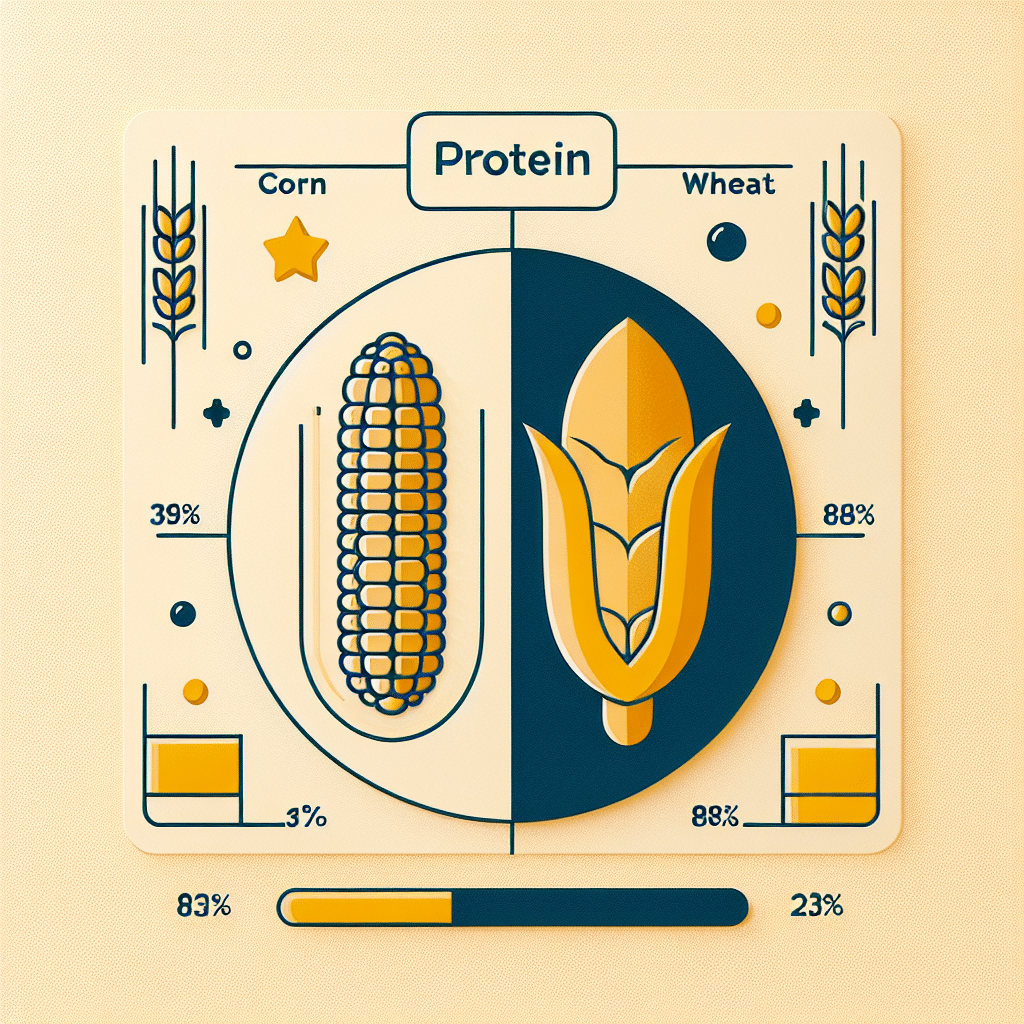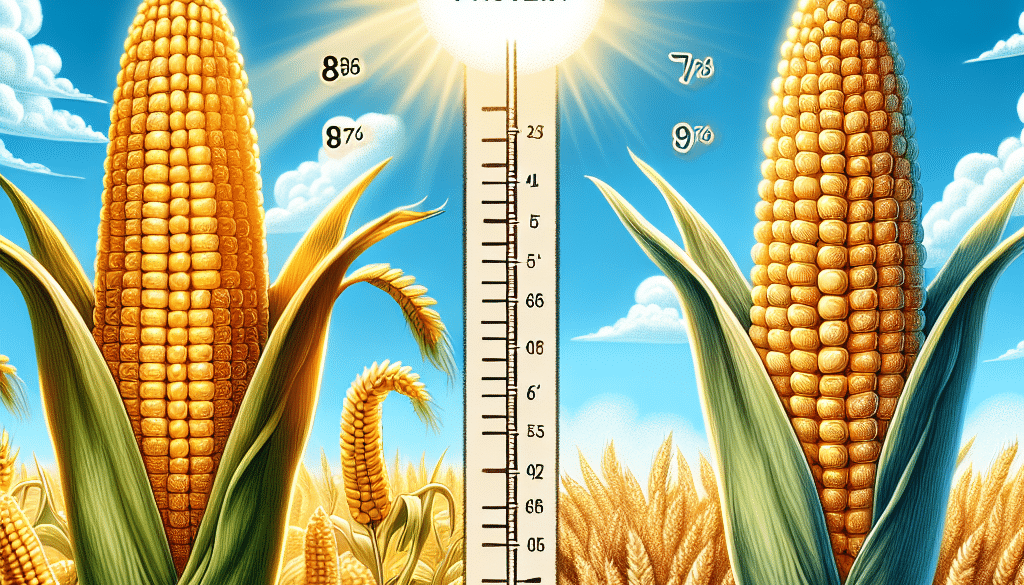Which Has More Protein Corn Or Wheat?
-
Table of Contents
- Protein Content Comparison: Corn vs. Wheat
- Understanding Protein in Grains
- Protein in Corn: An Overview
- Protein in Wheat: An Overview
- Comparative Analysis: Which Has More Protein?
- Nutritional Quality of Protein
- Health Implications and Dietary Considerations
- Case Studies and Statistics
- Conclusion: Making an Informed Choice
- Discover ETprotein’s High-Quality Protein Products
Protein Content Comparison: Corn vs. Wheat

When it comes to choosing grains in our diet, the nutritional content is a significant factor. Protein, being one of the essential macronutrients, plays a crucial role in building and repairing tissues, making enzymes and hormones, and supporting overall health. Two common grains that often come under scrutiny for their protein content are corn and wheat. This article delves into the protein content of these grains, comparing them and providing insights into which might be the better source of protein for your dietary needs.
Understanding Protein in Grains
Grains are a staple in many diets around the world and are valued for their energy-providing carbohydrates. However, they also contain varying amounts of protein, which is vital for those looking to maintain a balanced diet. The protein content in grains can be influenced by factors such as species, growing conditions, and processing methods.
Protein in Corn: An Overview
Corn, also known as maize, is a cereal grain that originated in Southern Mexico thousands of years ago. It is not only consumed directly by humans but also widely used as animal feed and for industrial purposes. The protein content in corn can vary depending on the type of corn and how it is consumed. For instance, sweet corn, the type often eaten on the cob, has less protein compared to field corn, which is used for making cornmeal, flour, and corn-based products.
- Sweet corn: Approximately 3.3 grams of protein per 100 grams
- Field corn: Approximately 9 grams of protein per 100 grams
Protein in Wheat: An Overview
Wheat is another widely consumed grain and is a staple food in many cultures, particularly in the form of bread, pasta, and cereals. Like corn, the protein content in wheat can vary. However, wheat generally contains a higher protein content than corn. The protein in wheat is also of a relatively high quality because it includes a significant amount of the essential amino acid lysine, which is limited in many plant proteins.
- Whole wheat flour: Approximately 13.2 grams of protein per 100 grams
- Refined wheat flour: Approximately 10.3 grams of protein per 100 grams
Comparative Analysis: Which Has More Protein?
When comparing the protein content of corn and wheat, it is clear that wheat typically contains more protein than corn. This is particularly true when comparing whole wheat to whole corn. The difference becomes even more pronounced when considering refined grain products, as refining tends to reduce the protein content.
Nutritional Quality of Protein
It’s not just about the quantity of protein but also its quality. Proteins are made up of amino acids, and the human body requires a balance of all the essential amino acids for proper function. Wheat protein is considered to be of higher quality in comparison to corn protein because it contains a greater balance of the essential amino acids that the body cannot produce on its own.
Health Implications and Dietary Considerations
For individuals looking to increase their protein intake, choosing wheat-based products may be more beneficial. However, it’s important to consider the whole nutritional profile of these grains. For example, corn is naturally gluten-free, making it a crucial staple for those with celiac disease or gluten sensitivity, whereas wheat is a major source of gluten.
Case Studies and Statistics
Studies have shown that diets rich in whole grains, like whole wheat, are associated with a lower risk of chronic diseases such as type 2 diabetes, heart disease, and certain cancers. The higher fiber content in whole wheat also contributes to better digestive health. On the other hand, corn has been a vital crop in regions where wheat is less accessible, providing a significant portion of daily caloric and protein intake.
Conclusion: Making an Informed Choice
In conclusion, while both corn and wheat provide protein, wheat generally offers more protein per serving. However, the choice between corn and wheat should also take into account other nutritional needs, dietary restrictions, and personal health goals. It’s essential to consider the whole nutritional profile and how each grain fits into a balanced and varied diet.
Discover ETprotein’s High-Quality Protein Products
If you’re looking to supplement your diet with additional protein, ETprotein offers a range of high-quality protein products that cater to various dietary preferences and needs. Their selection includes organic and non-GMO options such as rice protein, pea protein, and specialty proteins derived from watermelon seeds, pumpkin seeds, and more. These plant-based proteins are an excellent choice for those seeking allergen-free alternatives to traditional grain proteins.
About ETprotein:
ETprotein, a reputable protein and L-(+)-Ergothioneine (EGT) Chinese factory manufacturer and supplier, is renowned for producing, stocking, exporting, and delivering the highest quality organic bulk vegan proteins and L-(+)-Ergothioneine. They include Organic rice protein, clear rice protein, pea protein, clear pea protein, watermelon seed protein, pumpkin seed protein, sunflower seed protein, mung bean protein, peanut protein, and L-(+)-Ergothioneine EGT Pharmaceutical grade, L-(+)-Ergothioneine EGT food grade, L-(+)-Ergothioneine EGT cosmetic grade, L-(+)-Ergothioneine EGT reference grade and L-(+)-Ergothioneine EGT standard. Their offerings, characterized by a neutral taste, non-GMO, allergen-free attributes, with L-(+)-Ergothioneine purity over 98%, 99%, cater to a diverse range of industries. They serve nutraceutical, pharmaceutical, cosmeceutical, veterinary, as well as food and beverage finished product distributors, traders, and manufacturers across Europe, USA, Canada, Australia, Thailand, Japan, Korea, Brazil, and Chile, among others.
ETprotein specialization includes exporting and delivering tailor-made protein powder and finished nutritional supplements. Their extensive product range covers sectors like Food and Beverage, Sports Nutrition, Weight Management, Dietary Supplements, Health and Wellness Products, and Infant Formula, ensuring comprehensive solutions to meet all your protein needs.
As a trusted company by leading global food and beverage brands and Fortune 500 companies, ETprotein reinforces China’s reputation in the global arena. For more information or to sample their products, please contact them and email sales(at)ETprotein.com today.












